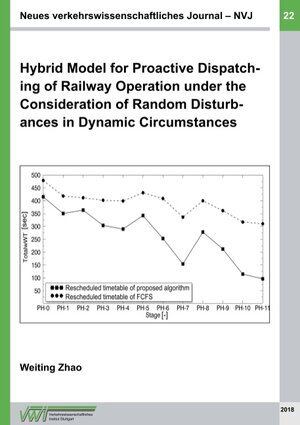
×
![Buchcover ISBN 9783746035017]()
Neues verkehrswissenschaftliches Journal - Ausgabe 22
Hybrid Model for Proactive Dispatching of Railway Operation under the Consideration of Random Disturbances in Dynamic Circumstances
von Weiting ZhaoWith the increasing traffic demand and limited infrastructure expansion, railway operation becomes more susceptible to the operational disturbances. In order to ensure a robust railway operation, a proactive dispatching algorithm in dynamic circumstances under the consideration of random disturbances is necessary. In this study, an operational risk map will be firstly produced: by simulating considerable amount of disturbed scenarios generated in a Monte-Carlo scheme and calculating the corresponding expected negative impacts, different levels of operational risk will be assigned to each block section in the investigated network. Within a rolling time horizon framework, conflicts are detected with the inclusion of risk-oriented disturbances in each block section, and the near-optimal dispatching solutions are calculated by using Tabu search algorithm. Finally, three indicators including total weighted waiting time, the number of relative reordering and average absolute retiming, are chosen to testify the effectiveness and advantages of the proposed dispatching algorithm. The sensitivity analysis of dispatching-related parameters is conducted afterwards to investigate the most appropriate relevant parameters for the specific studied area. The proposed algorithms are expected to be capable of automatically producing near-optimal and robust dispatching solutions with sufficient punctuality achieved.

















